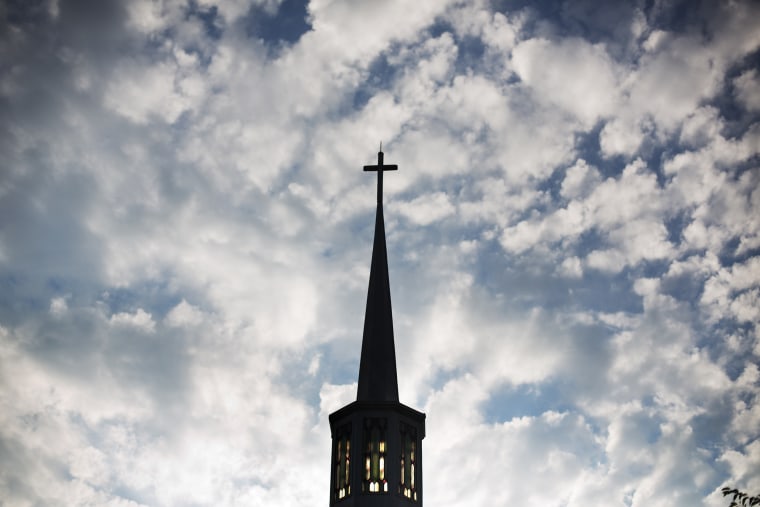One of the few proposals Donald Trump has talked about consistently, before and after the election, is his desire to change federal tax law to allow houses of worship to engage in partisan politicking. As the Associated Press reported, the president isn't the only Republican in D.C. who's made this a priority.
Churches should have the right to endorse political candidates and still keep their tax-free status, say House Republicans targeting a law that prohibits such outright politicking from the pulpit.Republicans repeatedly have failed to scrap the law preventing churches and other nonprofits from backing candidates, so now they are trying to starve it. With little fanfare, a House Appropriations subcommittee added a provision that would deny money to the IRS to enforce the 63-year-old law to a bill to fund the Treasury Department, Securities and Exchange Commission and other agencies.The subcommittee passed the bill Thursday.
At issue is something called the Johnson Amendment, which Trump and his GOP allies are so eager to gut. Whether they realize it or not, the change would likely carry sweeping consequences.
Circling back to our previous coverage on the debate, this tends to be an issue of great concern to the religious right movement and evangelical Christians, even if it's not on most of the country's radar.
So let's recap. Under current federal tax law, tax-exempt houses of worship are not allowed to intervene in partisan political campaigns. Ministries can obviously speak out on moral and spiritual issues of the day, and can even get involved in ballot referenda related to various policies, but churches and other houses of worship can't take steps to help (or hurt) candidates or political parties.
This law was created in 1954, thanks to the efforts of then-Sen. Lyndon Johnson, and for the most part, it hasn't been especially controversial.
But as the religious right movement became a more prominent fixture in Republican politics, the Johnson Amendment became problematic. Efforts to create a political machine involving pastors and congregations were stunted by the law -- because if a religious leader can't tell his or her congregation who to vote for without risking the ministry's tax-exempt status, the movement's potency has limits.
And so the religious right decided the Johnson Amendment has to go. Conservative activists even came up with an argument that seems vaguely compelling at first blush: those who lead houses of worship should be able to say whatever they wish to their congregants, and it's not the government's job to intervene. The First Amendment's free-speech protections, the argument goes, should be applied to ministers in the pulpit.
What's wrong with that argument? Quite a bit, actually.
When it comes to electioneering and tax law, houses of worship have effectively made a deal with the government: the pastors will enjoy the benefits of a tax-exemption, and in exchange, their ministry will be non-partisan. Trump and many congressional Republicans now want to scrap the deal: the churches should get the benefit of a tax exemption from the government, without any of the conditions.
As for the First Amendment, note that tax-exempt entities, including churches, have the option of getting involved in partisan politics, endorsing candidates, and intervening in campaigns to their hearts' content -- but they can't do this while keeping their tax exemption.
The consequences could be dramatic. Imagine the campaign-finance mess that would exist if parties, candidates, and PACs could funnel campaign donations through tax-exempt churches, free of oversight.
For that matter, imagine if a foreign government, eager to secretly help put a specific candidate in power, decided to start funneling money to specific churches, knowing that those ministries would in turn use the resources to support that candidate. The churches would never have to disclose any of this, and the public would be kept in the dark.
The GOP proposal fixes a problem that doesn't exist. There's no public demand for such a change, and there's no reason to create this campaign-finance nightmare.
